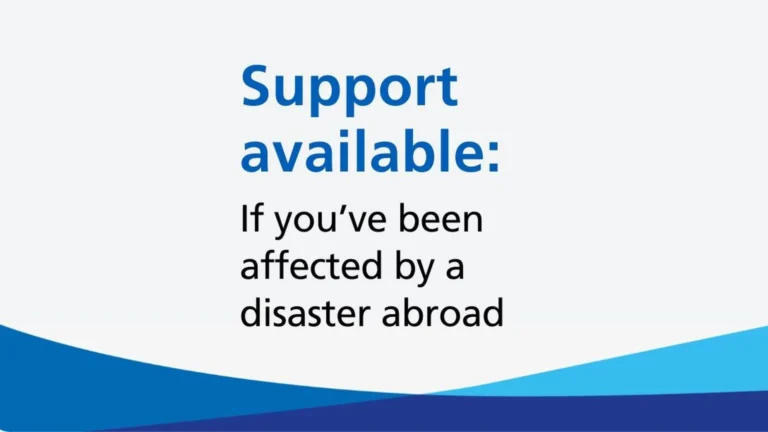Need to speak to someone?
Call 0116 254 4388
Chat live
Contact us via our online form
Amica provides counselling emotional and psychological support but not policy advice

Working when personally affected by events abroad such as political unrest, large-scale terrorist attacks, and natural disasters can be a challenging and overwhelming experience. We may have returned from the situation, or our loved ones may be caught up in events, and we are trying to navigate the familiar when our world has turned upside down. It’s essential to take care of your mental health during this period to avoid burnout and ensure you can continue in your role successfully. In this article, we’ll provide some tips for taking care of your mental health as you balance your work duties with making sense of what has just occurred to you.
Be mindful that you will need to look after yourself and put in place a few things. Here are some ways to do this.
Experiencing a traumatic event can lead to short-term effects and can impact not only those who were involved directly but people closely connected affected too. Common emotional reactions to trauma include:
These are natural responses as we try to comprehend and cope with the traumatic experience. While these reactions can be distressing, they usually diminish over time. Receiving practical, emotional, and social support from loved ones can be immensely beneficial in managing these challenging experiences.
If the events you have left you bereaved, know grief can affect us in many similar ways too.
Talking to your manager about your experiences can help them understand what you are going through and find ways to support you. If you need any adjustments or accommodations to keep you in the workplace or ease your transition back to work, let them know. For example, you may need time off for therapy sessions, or you may need to avoid certain triggers. Your manager can help you plan a manageable workload and schedule that accommodates your needs.
When returning to the workplace after being emotionally affected by events, it’s crucial to take things slowly. Don’t expect to jump back into your old work patterns right away. Give yourself time to adjust and readjust to your work environment. Start with shorter workdays, and gradually increase your hours as you feel comfortable. If you are struggling, talk to your manager about a flexible schedule or even working remotely. It’s better to take things slowly and get back to work fully than to rush and risk burning out.
If you have good working relationship your colleagues can be an essential source of support when you return to work. They can help you ease back into work by providing guidance, offering a listening ear, and even sharing their own experiences. Reach out to your coworkers, let them know you’ve been affected by events, and talk to them about how they can support you.
Self-care is essential when dealing with trauma. Taking care of yourself physically and emotionally can help you deal with the stress of returning to work. Make time for activities that you enjoy, such as exercising, meditation, or reading. Remember to eat well, sleep well, and take regular breaks throughout the day to rest and recharge.
Friends and family can be a great comfort and a source of much-needed information during developing situations, but there can be barriers to such contact. Connecting with others who have experienced similar situations can help you feel less alone and provide you with support and guidance. Consider joining a support group for people who have experienced trauma, such as war veterans or survivors of conflict. You can also connect with online communities or forums where you can share your experiences and connect with others who are going through similar situations.
Mindfulness is a technique that can help you focus on the present moment and manage your thoughts and emotions. Practicing mindfulness can help you regulate your emotions, reduce stress and anxiety, and improve your overall well-being. You can practice mindfulness by taking a few minutes each day to focus on your breath, meditate, or practice yoga.
If you are struggling to cope with your experiences and return to work, seek professional help. A mental health professional can provide you with the support you need to manage your symptoms and take care of your mental health. Just contact us at Amica and we’ll be able to offer you counselling and psychological tools. Your GP and your occupational health department can be important sources of help too.
Staying in or returning to work after being affected by adverse events abroad can be a complex experience. It’s essential to take care of your mental health during this period to avoid burnout and ensure you are okay in the workplace. After the event start slowly, reach out to colleagues and managers, prioritise self-care, seek professional help if needed, practice mindfulness, and connect with others who have experienced similar situations. Remember, taking care of your mental health is not a sign of weakness, but a simple acknowledgement that we’ve experienced something that needs attending to.
Amica provides counselling emotional and psychological support but not policy advice